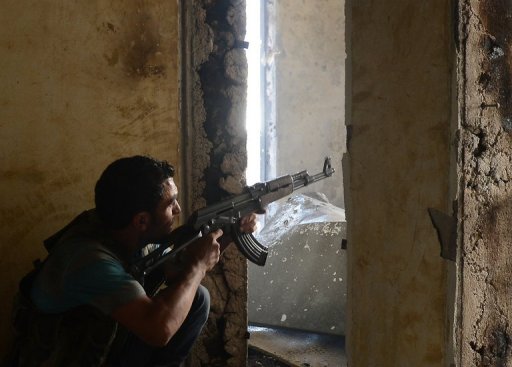By Marwa Awad / Reuters
CAIRO: The Muslim Brotherhood is locked in a power struggle with ruling generals over how much influence the army will have after civilians take over in three months time, a dispute that could decide whether democracy thrives after Hosni Mubarak’s ouster.
The tussle is over a new constitution, being drafted by an Islamist-led assembly, and focuses on the powers of the next president, the extent army privileges will be preserved and how much say the military will have in national security policy in future, Brotherhood members and an army official told Reuters.
Islamists are already embroiled in a more public argument with liberals, who have withdrawn from the body drawing up the constitution because they say it gives too much weight to Islamists and does not represent Egypt’s diversity.
But the outcome of the army row, largely being played out behind closed doors, is likely to have a far bigger impact.
It pits the two most influential players in the post-Mubarak era and will determine how much power will be retained by the old military guard who kept Mubarak in place once the formal handover to a newly elected president takes place by July 1.
“The Muslim Brotherhood wants more powers. They already have half the (Constituent Assembly), which basically gives them control over drafting the constitution,” said an army official, who asked not to be named.
The Islamists, repressed by the former military officers who ruled Egypt for decades, say elected institutions should decide.
“The demands of the military council are illogical. It wants to interfere in the writing of the constitution. It wants to impose conditions for itself and on the new government,” said Medhat Hadad, a senior member of the Brotherhood.
“But the party with the parliamentary majority must form the government. Appointing, sacking or withdrawing confidence from the government must be in the hands of parliament. These powers must not be with the president,” he said.
Trading Threats
The Brotherhood, with the biggest bloc in parliament, is pushing for legislators to withdraw confidence from the army-backed cabinet. Even if they do, the ruling army council can ignore it as it holds presidential powers to appoint ministers.
According to Brotherhood officials, the two sides locked horns at a closed-door meeting on March 22 with both sides trading threats, just two months before the presidential vote.
“We threatened to withdraw confidence from the government and the response from someone high ranking was another threat that he ‘has the decree to dissolve parliament in his office drawer waiting to be used’,” said Hadad.
“It is not right. The state cannot be managed with such brinkmanship at all,” he said.
Army officials would not confirm the account.
While the Brotherhood is maneuvering for a stronger role for parliament, the army wants to retain a key role for itself and ensure executive powers are more evenly spread.
“There must be a decentralization of power. The constitution must divide powers amongst the president, the government and parliament,” said the army official, who has asked not to be identified as he was not authorized to make public statements.
It wants the new constitution to set up a National Security Council that would include the president, key foreign, defense and interior ministers, and military personnel. It would be along the lines of the National Defense Council in the old constitution, but with more carefully delineated powers.
“The council’s new mandate would be set in a law in which the president would not be able to pass a decision regarding national security without the military’s consent and the consent of other members in the council,” the army official said.
The army, he added, is better at understanding national security needs.
New worries
The army-chosen cabinet first raised the idea in November of giving the army a broad remit over national security in the constitution. Islamists and others fumed against it at the time.
The army frets it could lose control to Islamists of foreign affairs and national security that it regards as vital to its interests. For example, the army receives $1.3 billion a year in US military aid under a program set up after Egypt made peace with Israel in 1979. It does not want that jeopardized.
The Brotherhood, however, says it respects Egypt’s treaties.
Army rulers also want to protect the military budget and its businesses and factories — worth billions of dollars — from civilian oversight. The army’s civilian businesses are now exempt from tax, but they say they are now happy to pay it.
“The military has always contributed to the state. In the new state, it will redirect part of its profit to it,” the official said.
All these are new worries for the military, which has had its own man in charge since the “Free Officers” of Gamal Abdel Nasser toppled the king in 1952. Mubarak, a senior military officer like his predecessors, was steeped in army thinking and could be relied on by generals to secure their interests.
The new order threatens that, putting at risk the privileges such as sinecure jobs for retired generals and the military’s broad business interests, as well as raising the prospect of prosecution — like Mubarak, now on trial over killings of protesters last year and for graft during his 30 years in power.
“Field Marshal Hussein Tantawi said back in November that the role of the military will remain as it has been in previous constitutions. This still stands,” the army official said.
The Brotherhood is closer to power than it has ever been in its 84-year history. But memories of the repression under Mubarak and his predecessors are far too fresh for complacency.
“The Brotherhood needs to maintain the gains it has made and they feel the military is pulling the rug from underneath their feet,” said a member of parliament for the Brotherhood’s Freedom and Justice Party. “This is a struggle for power, not a struggle to save the nation, unfortunately,” he added.


